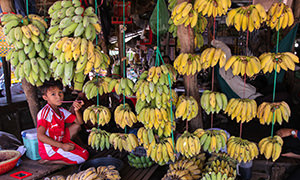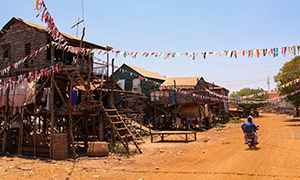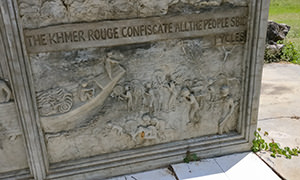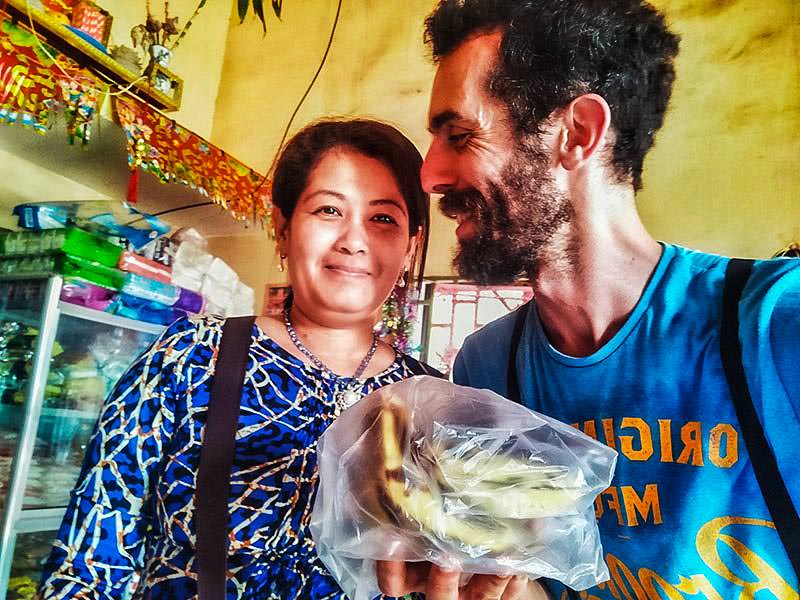Khmer New Year provides an opportunity for one of Cambodia’s most lingering celebrations! After three official public holiday days, filled with dancing, karaoke singing, eating, drinking, and water splashing, another week of decompression time follows. With pretty much the same kind of content. These people just never get tired of partying!
In the small town of Kampong Chhnang, long holidays mean that many businesses are closing down for the week, everything slows down as families get together, travel planning can become a nightmare, but also finding a restaurant or a shop that can feed one’s empty stomach.
In a week when even haggling at a market might not work as usual, discovering an unexpected act of kindness becomes an even more precious experience.
I have witnessed an act of generosity between perfect strangers on a Wizz Air flight - check it out!
Greed is unfunctional
Walking through the typically uncleaned streets of Kampong Chhnang, showing how respect for the environment is proportional to the system’s efforts to arrange how the society works, I find a hundred-dollar bill, just sitting in the dust.
Nice forgery in Cambodia, where counterfeiting notes is not unknown, but is also a part of the New Year celebration, where it’s easier to distribute happiness around with fake money than the real one.
While reflecting on this seemingly worthy bill in the street of a country as poor as Cambodia, I’m drawn to the conclusion that the hunger for always more might just be unfunctional. It is easier to earn money quickly on a forged bill with a higher denomination, but also that kind of bill will be the most suspect one. Being modest, even in greed, sometimes pays off better.
In Southeast Asia my bearded Westerner appearance often gets me being offered marijuana in the street, so I understand they can’t imagine a drug addict getting hungry!
Hungry as I was, I enter the first little shop (well, not expecting to spend my fake, but real dollars!). Several kids and grownups sit on the floor, nobody understanding English. In this small shop that seems to sell just anything someone may want to buy, I try to use body language to explain that I am searching for food.
During my exploration of Kampong Chhnang's countryside on a bicycle, I practically ended up dehydrated. Learn how to avoid the dangers when traveling!
Cigarettes against hunger?
I put my fingers on my mouth, mimicking the act of eating. And soon they drag me to the glass case, showing their offer of cigarettes to buy. In Southeast Asia my bearded Westerner appearance often gets me being offered marijuana in the street, so I can understand they don’t imagine a drug addict could possibly be hungry!
“No, no! I am searching for food, something to eat… You know, cookies! Or something like that!”, I say with my upgraded body language of eating a thin air.
They walk me to another cabinet and show their selection of chewing gums.
“Nice, thank you. Maybe later! Now I am in search of some proper food. You know, something like… ”

I look around the shop, hoping that among the toilet paper and soaps, I can find something actually edible. Hanging on the wall, I notice several bags with fruit and vegetables. I pick hopefully the most international word of them all and say…
“You know, bananas. That is food! Something like that!”
“Bananas!”, they smile with that proud look of finally understanding.
Kindness feeds so much more
The next thing the lady does: she takes the bag off of the wall, opens it, halves the cluster of bananas, and offers me eight small pieces of soon-turning-black fruit, that I will find the tastiest in my entire SE Asian trip.
Trying to understand her body language now, she doesn’t want to get paid for that. Not being sure what it all means, I insist on her saying the price. They talk among each other, trying to figure out how to say “no money” in English. And then the youngest, preschool girl, loudly takes the stand: “NO!”
Not wanting to offend anyone, I accept this gift of food and ask for a picture with the lady who just embodied the meaning of kindness for me. She modestly fixes her hair and poses with me and bananas.
If the car doesn’t kill you, it will drive back and run over you again. Because that is cheaper than if you stay aliveCambodian
“Before it was different. If you needed anything, you just came to your neighbor, asked for it, and got it. Now everything revolves around money”, the owner of the guesthouse I decided to stay at, will tell me a couple of days later.
Cambodia’s way now is to charge everything double, she explains, raising this unexpected kindness episode to even more appreciating levels. “Trust me, always ask for a 50 percent discount! Even with that, they make a profit!”, the guesthouse owner instructs.
Culture of cheating and bribing
In a heavily corrupted society, Cambodians have learned that selfishness is a better method of protecting oneself than kindness. “Many of them go to bed just thinking of how they will cheat. In the morning they wake up, and cheat!”, one Cambodian tells me.

The government is the hungry beast locals need to feed as well. Supposedly, if you own a business, you might be called to a Governor’s office and told: “It’s Khmer New Year now, it would be good if you give us something.”
How much, you might innocently ask.
“Depends on you. But the more, the better”, the official will say. In a way, you might be forced to pay 50 to 100 thousand Riels (approx. 12 to 25 US dollars), and not know what is it for and where is this money going. No receipt for this act of kindness is being given.
Retaliation in banana monarchy can be mortal
“If you don’t comply, they can make you problems”, I learn. And what I hear next, leaves me speechless: “The easiest to do it is with a traffic ‘accident’. Also, if the car doesn’t kill you, they will drive back and run over you again. Because that is cheaper than if you stay alive. It can be 3 million. The other method they use is to plant drugs at your place, only to ‘find’ it and use the accusation for closing your business. It happens often!”

Not getting into the facts of these claims, it is evident the system is very productive in creating fear. If the collected money mainly goes into the private hands, while exhausting forests, minerals, and other natural resources, it is obvious why one cannot see clean streets, a raised quality of life, or dealing with poverty issues.
Some people I talk to would even say it is worse than during Pol Pot, dreaming that elections in 2018 will change something. Moving somewhere else is a comforting dream, but living with the devil you know is sometimes easier than starting from zero. And this is how destinies get sealed.
Tiger as a roommate
“If you live with a tiger, you have to give him a piece of your muscle, if you want to stay alive. Otherwise, he would eat your whole body!”, one of my interlocutors reveals the rule of surviving in Cambodia today.
The nation went through an amazingly tragic recent history, with a regime that was killing the intellectuals, confiscating private property, raping, torturing, and executing anyone they wanted.
Only to be inherited by a facade of democracy, with flaws, widespread corruption, and fear?
Honestly, I don’t know why kindness can still survive such a tragic sequence of national disasters. I guess you cannot feed bananas to the tiger. Unless you raise one that is a vegetarian.
If you want to learn more about the extent of corruption in Cambodia, you can read this report.



It is a great article, very insightful and touching. It was a pleasure to read and look through the pictures. Thank you for sharing.
Thank you so much for your comment! I hope you’ll enjoy the rest of the website too!